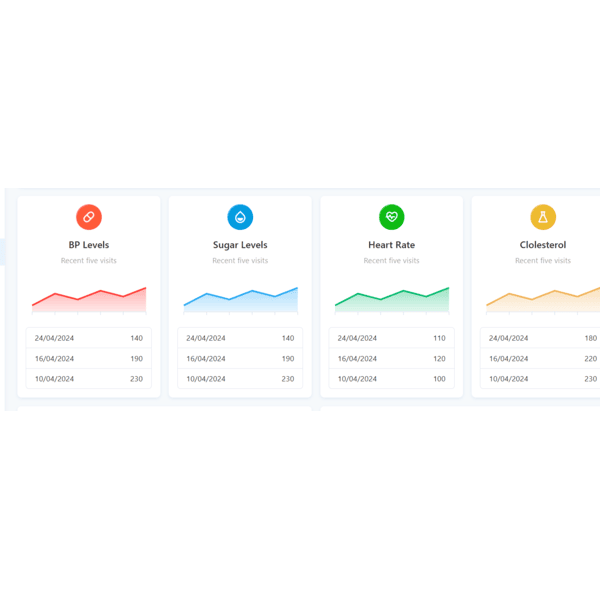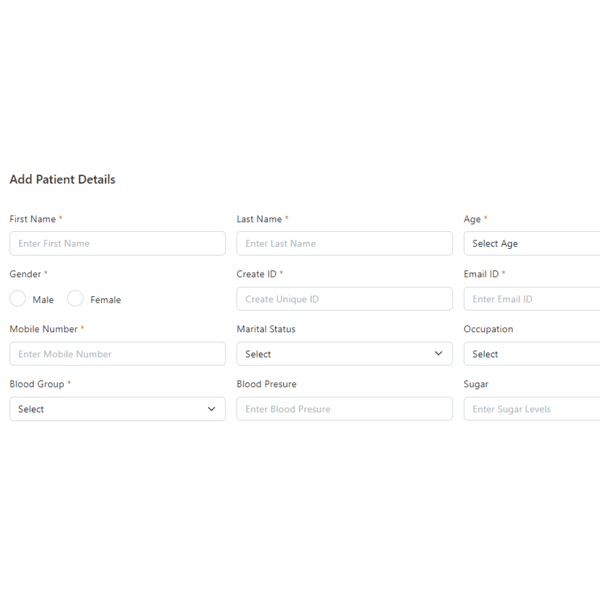For hospitals and clinics, a Customer Relationship Management (CRM) system is essential for improving patient care, streamlining operations, and enhancing overall patient satisfaction. Our CRM systems are specifically designed for the healthcare sector, including core features and benefits:

CRM for Hospitals – Patient Dasboard
Quick view of key health metrics such as weight, blood pressure, blood sugar levels, etc. Displays personal details like name, age, contact information, and insurance details. View your patient history at one place.
Easily Add Patient info:
You can easily create or add a new Patient with our easy to use interface. Fill required details to keep patient history for review on next follow ups.

Key Features of a CRM for Hospitals and Clinics
-
Patient Management:
- Profile Creation & Management: Comprehensive records of each patient, including personal information, medical history, treatments, and interaction logs.
- Appointment Scheduling: Simplified process for scheduling, rescheduling, and canceling appointments.
- Automated Reminders: SMS, email, or push notifications for appointment reminders, follow-up visits, and medication adherence.
-
Lead & Patient Acquisition:
- Lead Tracking & Conversion: Track leads from various channels (website, social media, referrals) and monitor the conversion to patients.
- Marketing Campaigns: Automate marketing campaigns targeted to specific patient groups (e.g., wellness programs, immunization drives, etc.).
-
Patient Communication:
- Multi-Channel Communication: Communicate with patients through email, SMS, voice calls, or mobile apps.
- Patient Portals: Self-service portals for patients to access their medical records, lab results, and communicate with healthcare providers.
- Telemedicine Integration: For clinics/hospitals offering remote consultations, integrate telemedicine features within the CRM.
-
Care Coordination:
- Collaborative Care Teams: Share patient data with authorized healthcare professionals, allowing for a team-based approach to care.
- Case Management: Track ongoing treatments, follow-ups, and referrals for patients with complex conditions.
-
Data Security and Compliance:
- HIPAA Compliance: Ensure the CRM adheres to healthcare regulations like HIPAA (in the U.S.) to protect patient privacy.
- Encrypted Data: Secure storage and transmission of sensitive medical data.
-
Analytics & Reporting:
- Patient Metrics: Track patient outcomes, satisfaction surveys, and treatment success rates.
- Operational Analytics: Monitor clinic or hospital performance, appointment no-shows, staff utilization, and other key metrics.
-
Billing & Payment Management:
- Integrated Billing: Handle billing and payment processing directly through the CRM.
- Insurance Integration: Automate insurance verification, claim submission, and follow-ups.
-
Referral Management:
- Referral Tracking: Track incoming and outgoing referrals, ensuring that all necessary steps are taken to provide care.
- Specialist Integration: Manage patient referrals to specialists, track the referral process, and ensure proper documentation.
Benefits of Using a CRM in Hospitals and Clinics
- Improved Patient Care: With better communication and coordination between healthcare providers, patients experience more consistent and personalized care.
- Increased Efficiency: Automating routine tasks like appointment scheduling, reminders, and billing reduces administrative burden on staff.
- Better Patient Retention: By maintaining strong relationships through timely communication and personalized care, patients are more likely to return for ongoing treatment and refer others.
- Enhanced Patient Experience: Features like appointment reminders, easy communication channels, and quick access to medical records contribute to a smoother patient experience.
- Actionable Insights: With reporting and analytics, healthcare providers can identify trends in patient care, satisfaction, and clinic performance, leading to more informed decision-making.